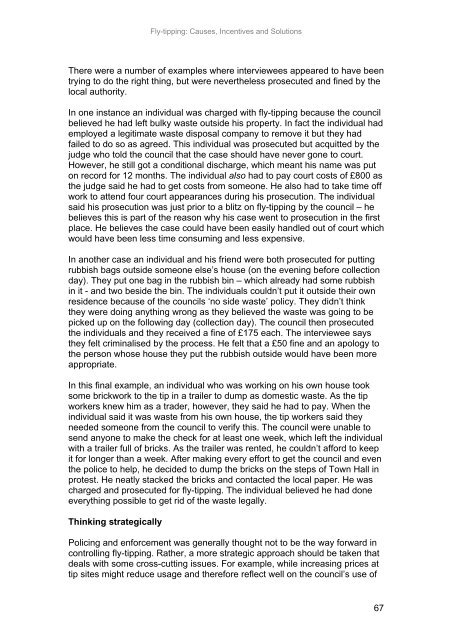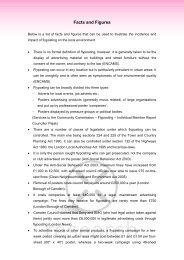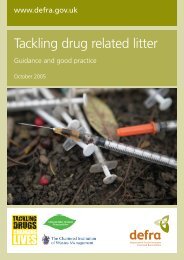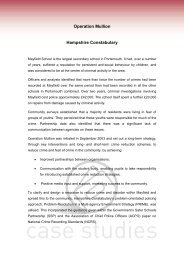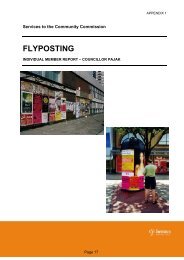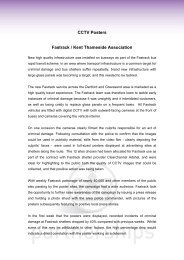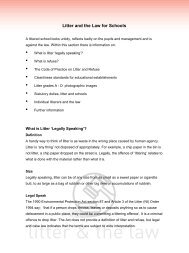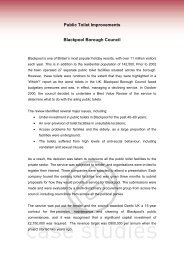Fly-tipping: Causes, Incentives and Solutions - Keep Britain Tidy
Fly-tipping: Causes, Incentives and Solutions - Keep Britain Tidy
Fly-tipping: Causes, Incentives and Solutions - Keep Britain Tidy
Create successful ePaper yourself
Turn your PDF publications into a flip-book with our unique Google optimized e-Paper software.
<strong>Fly</strong>-<strong>tipping</strong>: <strong>Causes</strong>, <strong>Incentives</strong> <strong>and</strong> <strong>Solutions</strong><br />
There were a number of examples where interviewees appeared to have been<br />
trying to do the right thing, but were nevertheless prosecuted <strong>and</strong> fined by the<br />
local authority.<br />
In one instance an individual was charged with fly-<strong>tipping</strong> because the council<br />
believed he had left bulky waste outside his property. In fact the individual had<br />
employed a legitimate waste disposal company to remove it but they had<br />
failed to do so as agreed. This individual was prosecuted but acquitted by the<br />
judge who told the council that the case should have never gone to court.<br />
However, he still got a conditional discharge, which meant his name was put<br />
on record for 12 months. The individual also had to pay court costs of £800 as<br />
the judge said he had to get costs from someone. He also had to take time off<br />
work to attend four court appearances during his prosecution. The individual<br />
said his prosecution was just prior to a blitz on fly-<strong>tipping</strong> by the council – he<br />
believes this is part of the reason why his case went to prosecution in the first<br />
place. He believes the case could have been easily h<strong>and</strong>led out of court which<br />
would have been less time consuming <strong>and</strong> less expensive.<br />
In another case an individual <strong>and</strong> his friend were both prosecuted for putting<br />
rubbish bags outside someone else’s house (on the evening before collection<br />
day). They put one bag in the rubbish bin – which already had some rubbish<br />
in it - <strong>and</strong> two beside the bin. The individuals couldn’t put it outside their own<br />
residence because of the councils ‘no side waste’ policy. They didn’t think<br />
they were doing anything wrong as they believed the waste was going to be<br />
picked up on the following day (collection day). The council then prosecuted<br />
the individuals <strong>and</strong> they received a fine of £175 each. The interviewee says<br />
they felt criminalised by the process. He felt that a £50 fine <strong>and</strong> an apology to<br />
the person whose house they put the rubbish outside would have been more<br />
appropriate.<br />
In this final example, an individual who was working on his own house took<br />
some brickwork to the tip in a trailer to dump as domestic waste. As the tip<br />
workers knew him as a trader, however, they said he had to pay. When the<br />
individual said it was waste from his own house, the tip workers said they<br />
needed someone from the council to verify this. The council were unable to<br />
send anyone to make the check for at least one week, which left the individual<br />
with a trailer full of bricks. As the trailer was rented, he couldn’t afford to keep<br />
it for longer than a week. After making every effort to get the council <strong>and</strong> even<br />
the police to help, he decided to dump the bricks on the steps of Town Hall in<br />
protest. He neatly stacked the bricks <strong>and</strong> contacted the local paper. He was<br />
charged <strong>and</strong> prosecuted for fly-<strong>tipping</strong>. The individual believed he had done<br />
everything possible to get rid of the waste legally.<br />
Thinking strategically<br />
Policing <strong>and</strong> enforcement was generally thought not to be the way forward in<br />
controlling fly-<strong>tipping</strong>. Rather, a more strategic approach should be taken that<br />
deals with some cross-cutting issues. For example, while increasing prices at<br />
tip sites might reduce usage <strong>and</strong> therefore reflect well on the council’s use of<br />
67


